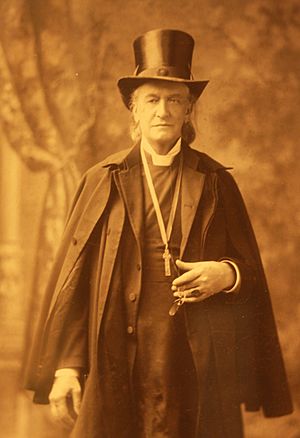Henry Benjamin Whipple facts for kids
Quick facts for kids The Right Reverend Henry Benjamin Whipple D.D. |
|
|---|---|
| Bishop of Minnesota | |

Whipple in 1898
|
|
| Church | Episcopal Church |
| Diocese | Minnesota |
| Elected | June 30, 1859 |
| In Office | 1859–1901 |
| Successor | Samuel Cook Edsall |
| Orders | |
| Ordination | July 16, 1850 |
| Consecration | October 13, 1859 by Jackson Kemper |
| Personal details | |
| Born | February 15, 1822 Adams, New York, United States |
| Died | September 16, 1901 (aged 79) Faribault, Minnesota, United States |
| Buried | Cathedral of Our Merciful Saviour |
| Nationality | American |
| Denomination | Anglican (prev. Presbyterian) |
| Parents | John Hall Whipple & Elizabeth Wager |
| Spouse |
Cornelia Ward Wright
(m. 1842; died 1890)Evangeline Marrs Simpson
(m. 1896) |
| Children | 6 |
Henry Benjamin Whipple (born February 15, 1822 – died September 16, 1901) was an important American leader. He was the first Episcopal bishop of Minnesota. Whipple became famous for his kindness and for standing up for Native American people. He was often called "Straight Tongue" by the Dakota people because he was always honest with them.
Contents
Who Was Henry Whipple?
Henry Benjamin Whipple was born in Adams, New York, in 1822. He grew up in the Presbyterian church. Later, he joined the Episcopal Church. This happened because of his grandparents and his wife, Cornelia. He married Cornelia in 1842.
Early Life and Calling
Whipple went to Oberlin College for a short time. After that, he worked in his father's business. He later decided to become a minister. He was officially made a deacon in 1849. Then, he became a priest in 1850.
He worked in churches in Rome, New York and Chicago. In Chicago, he became known for helping poor people and immigrants. His work there caught the attention of the new Episcopal Diocese of Minnesota.
A New Bishop in Minnesota
In 1859, Henry Whipple was chosen to be the first bishop of Minnesota. He served in this role for over 40 years, until his death in 1901. He helped the Episcopal Church grow a lot in Minnesota.
He often traveled across the state, even in winter. He preached in homes, schools, and even saloons. He worked hard to unite the church members. He also helped start important schools. These included Seabury Divinity School and Shattuck School for boys. He also helped found St. Mary's Hall for girls.
Standing Up for Native Americans
Bishop Whipple is most famous for helping Native Americans. He saw that the government's policies towards them were unfair. He wanted to change this. He visited many Native American villages. He also helped build missions, like the one at the White Earth Reservation.
After the Dakota War of 1862 in Minnesota, many Dakota people were sentenced to death. Whipple asked President Abraham Lincoln to show mercy. He argued against executing all of them. Because of his efforts, Lincoln pardoned 265 Dakota men. This was not popular at the time. Whipple was brave to speak out.
His Legacy and Memorials
Bishop Whipple's work is remembered in several ways. The Bishop Whipple Federal Building in Fort Snelling, Minnesota, is named after him. There is also Bishop Whipple Hall at Concordia College in Moorhead, Minnesota.
He is buried under the altar of the Cathedral of Our Merciful Saviour in Faribault, Minnesota. This is a church he helped build.
His Family
Henry Whipple married Cornelia Wright in 1842. They had six children together. Cornelia passed away in 1890. Later, in 1896, Whipple married Evangeline Marrs Simpson.
His uncle was State Senator David Wager. His first cousin was United States Army General Henry Halleck.
Images for kids
 | Selma Burke |
 | Pauline Powell Burns |
 | Frederick J. Brown |
 | Robert Blackburn |





